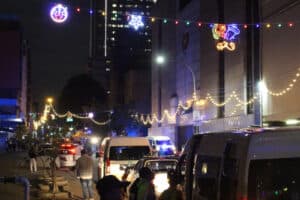The tariff increase will not be felt equally by all customers, some may even experience a higher percentage increases than others.

City Power has confirmed that even if you don’t put in any prepaid electricity units, you will be charged its new R200 basic charge.
Electricity tariffs in Johannesburg were increased by 12.7% on Monday.
Prepaid customers will now be subject to the R200 charge to bridge the fixed network operating cost gap.
Currently, residential consumers do not effectively contribute to the costs of repairing and maintaining the network to ensure availability on demand, hence the implementation of the basic charge.
This charge consists of a R70 service charge and a R130 network capacity charge, exclusive of Value Added Tax (Vat).
ALSO READ: Nersa not willing to accept municipal tariff ruling
Tariffs will increase gradually over time.
City Power’s spokesperson, Isaac Mangena said residential prepaid customers, who currently don’t pay a basic charge, will be gradually introduced to this new charge in the coming years.
Mangena said those who are the most vulnerable, will not be subjected to the R200 basic charge and continue to be subsidized by other customer categories.
“The indigent prepaid customer will be placed on a tariff that does not attract service and capacity charges, as a measure of cushioning the particular customer category due to its vulnerability,” he said.
The R200 basic charge will not be applied all at once, but rather in increments over a period of time.
Although the exact timeline for the gradual introduction of the R200 basic charge is not specified the purpose of the gradual introduction is to minimise the shock of the tariff increase on prepaid customers.
ALSO READ: ‘Yes, it’s going up, but you can do something about it’ – Municipal tariff hikes kick in today
Basic charge increase and how it will work
The tariff increase will not be felt equally by all customers, some may even experience higher percentage increases than others.
Residential low prepaid customers (indigent) will pay 6.21% more meaning, R49.17 extra for 374kWh. While residential high prepaid customers will pay R443.81 more for 800kWh.
Additionally, the R200 basic charge will be recovered upfront from non-indigent customers when they purchase electricity.
“The total basic charge(R200) will be recovered from the qualifying prepaid customers using the prepayment platform,” Mangena explained.
ALSO READ: City Power’s tariff increase: What you need to know
This will ensure adequate contribution is made to the fixed network operating cost.
Moreover, customers purchasing less than R400 worth of electricity at the beginning of the month will have their payment split between covering the fixed charge and consumption-related charges.
The split can be classified into the category “fixed charge” where R200 of the R400 will go towards covering the basic charge. The remaining R200 can be considered the “consumption charge”, this will go towards buying electricity units.
Consumers will not be able to evade the basic charge.
According to City Power, “Should a customer on the first day want to buy electricity for the first time in the month with R300, R40 will be set aside for VAT the balance R260 will be split 50/50 between covering the fixed charge (R130) and the remainder R130 towards purchasing kWh’s.”
ALSO READ: More above-inflation increases for municipal services in SA will hit on 1 July
This way, the customer gets some electricity with each purchase, and the fixed charge is gradually paid off over time.
If the customer doesn’t use all the electricity they purchased, any remaining balance will be carried over to the next month.
However, the R200 basic charge is a monthly expense, so the customer will still need to pay it every month, either fully or partially, depending on their electricity purchases.
Indigent consumer qualifier
Registered indigent customers will continue to receive the residential low indigent prepaid tariff, which will remain based on the inclining block tariff methodology prescribed by Nersa.
Qualifying citizens can access Free Basic Electricity (FBE) and are encouraged to approach their nearest Service Delivery Centre or regional walk-in centres to register for the Expanded Social Package (ESP) rebates.
The City of Johannesburg (COJ) said it “recognises that the economic status of a family might improve over time. To ensure that only the poorest families are catered for, the City requires registered citizens to reapply for indigent status every six months.”
ALSO READ: High Court orders Joburg and City Power to pay R1.073 billion debt to Eskom
According to the City of Joburg, the following consumers qualify to receive the ESP:
- The unemployed;
- Women and children;
- Youth;
- Senior citizens;
- Persons with Disabilities (PWDs);
- Displaced persons.
Furthermore, those with an income of R6 281.13 or less also qualify for the ESP.






